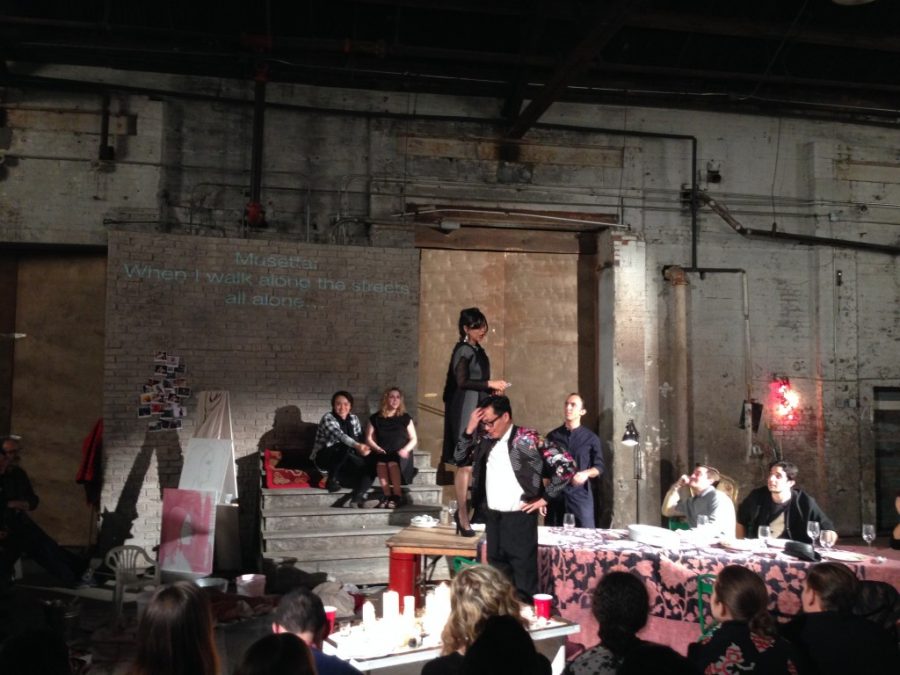

“Art is the thrilling spark that beats death – that’s all.”
Brett Whiteley
With lamentations over the deaths of the Amato and the City Opera fading, LoftOpera has come along at just the right time. In its sterling production of Puccini’s "La Boheme", the best qualities of both vanished companies are brought back in a way that is new and exciting. Youth, intimacy, great singing and innovative staging are to be found in one place, along with an orchestra. And the magic of installation art and site-specific theater has been brought to opera. It’s about time.
This loft is a beautiful old building in East Williamsburg (where else?) that has been converted into a space for art galleries and film shoots. LoftOpera transforms it into the ramshackle digs of Puccini’s bohemians in a way no stage set ever could. The bohemians are not onstage, they are within feet of you. They use the air you breathe to sing magnificent arias. They share their wine with you, and when they paint, fight, make love and die they do it right in front of you. It’s nothing short of thrilling.
The young cast is superb. As Rodolfo, Won Whi Choi sings with power and nuance. In a realistic, understated performance he is the most believable Rodolfo I have ever seen. His “Che gelida manina”, the aria that reportedly terrified Caruso, is powerful, clear, and seems to be born in the moment instead of having been contrived for effect. His duets with his fellow singers are shared creations, with singers exchanging emotions with one another in a manner that mirrors the most intimate conversation.
As for Mimi, how can one sing powerfully when one is supposed to be dying of tuberculosis? Liana Guberman solves the problem by relying on her acting to portray Mimi’s illness and her singing to convey her emotions. This deceptively simple solution works splendidly. Her voice is sonorous yet sad, occasionally fragile. Her arias are hauntingly beautiful, especially “O buon Marcello, aiuto!” but she really shines in her duets with Choi. In fact, it is the duets that are the heartbreaking highlights of this production.
The amazing Joshua Jerimiah creates a powerful, funny and tormented Marcello with a magnificent baritone that could fill the biggest opera house in the world. His face is as powerfully expressive as his voice ("Rigoletto" soon, hopefully). And as Musetta, Larisa Martinez is delightful, embodying every nuance of that infamously charismatic character. Her aria, the famous and dazzling “Quando m’en vo’” is enchanting, her voice moving from that of a young flirtatious girl to that of a sultry, experienced woman in one effortless breath.
The production is overstaged by director Laine Rettmer. While much of the staging is quite fine, there are too many bits of business that actually distract from great moments. Most egregious is the addition of some absurd gunplay by Musetta in the middle of Rodolfo and Mimi’s beautiful Act lll duet. This spoils what should have been a moving moment between the lovers. Fortunately these silly gags are few in number and the final moments in which the bohemians witness Mimi slipping towards an inevitable death are quite powerful. The change in Martinez’s Musetta is especially moving, and Rodolfo’s final plea to Marcello, “quel guardarmi così?...” is utterly shattering. And again, it happens within feet of the audience.
New York opera has often struggled in its relationship with the avante garde. Recent productions of "Nixon in China" at the Met and "Einstein at the Beach" at BAM were astonishing in their slavish devotion to original staging and design. They were presented as museum pieces of the recent past; ossified before their time. But LoftOpera gives its audience the long-lost thrill of the unexpected. After so much death, New York opera fans owe their beloved art a chance at new life. And young people on the fence with opera need a reason to give it a try. The City Opera is dead. Long live the Loft.
Through March 1 at The 1896.